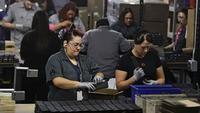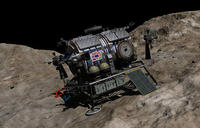-
Justice Department agrees 1986 snooping law should be reviewed
The U.S. Justice Department said earlier this week that it supports reviewing legislation which allows U.S. law enforcement officials to read someone’s e-mails without a search warrant. The 1986 Electronic Communications Privacy Act (ECPA) states that federal authorities only need a subpoena issued by a federal prosecutor, not a judge, to search through a person’s e-mails which are older than 180 days or which have already been opened.
-
-
Gun manufacturer to leave Colorado after governor signs gun bill

Colorado governor John Hickenlooper on Wednesday signed a state gun control bill which will expand background checks and limit ammunition magazine capacity. The measure is notable because Colorado has been considered a firearm-friendly state.
-
-
U.S. infrastructure grade raised from D to a D+, but problems loom
The American Society of Civil Engineers (ASCE), in its just-released 2013 Report Card for America’s Infrastructure, gave the U.S. infrastructure an overall grade of D+, showing slight progress from the D in the last Report Card issued in 2009. The Report Card concludes that to raise the grades and get U.S. infrastructure to an acceptable level, a total investment of $3.6 trillion is needed by 2020. Currently, only about $2 trillion in infrastructure spending is projected, leaving a shortfall of approximately $1.6 trillion.
-
-
Improved weather, climate predictions strengthen the U.S. economy
The economic costs of damaging weather events have an immense and increasing impact on the U.S. economy. These costs could be anticipated and mitigated by improved weather and climate predictions, say a range of experts in the public and private sectors. These experts will meet in early April in an American Meteorological Society event to discuss the economic benefits of how environmental forecast, prediction, and observation programs and services strengthen the U.S. economy.
-
-
New technology for carbon-dioxide capture, clean coal reaches milestone

An innovative new process which releases the energy in coal without burning — while capturing carbon dioxide, the major greenhouse gas — has passed a milestone on the route to possible commercial use.
-
-
Instead of a renaissance, U.S. nuclear energy industry is facing tough times
Five years ago, U.S. nuclear industry executives and energy industry analysts talked about an American nuclear renaissance, with up to twenty new reactors to be added to the nation’s stock. Things are very different today, however, and the U.S. nuclear energy industry, rather than expanding, is fighting to hold on.
-
-
NRC rejects plan for Maryland nuclear reactor
A plan to build a third nuclear reactor in southern Maryland was postponed last week as the Nuclear Regulatory Commission (NRC) upheld an earlier decision to squash the project. the primary reason for the rejection is the fact that the applicant’s parent company, Electricite de France, is 85 percent owned by the French government. U.S. law forbids foreign ownership of U.S. nuclear reactors.
-
-
Widely used FBI surveillance method ruled unconstitutional

A national security letters (NSLs) is an administrative subpoena which allows the FBI to ask Internet companies and communication service providers to turn over subscriber information on American customers, while prohibiting the providers from informing these customers that their personal information has been turned over to the FBI. Since the 9/11 attacks, the bureau has issued an average of 50,000 NSLs a year. A federal judge in California says this is “rendering the statute impermissibly overbroad.”
-
-
Petroleum use, greenhouse gas emissions of U.S. automobiles could drop 80 percent by 2050
A new National Research Council study finds that by the year 2050, the United States may be able to reduce petroleum consumption and greenhouse gas emissions by 80 percent for light-duty vehicles — cars and small trucks — via a combination of more efficient vehicles; the use of alternative fuels like biofuels, electricity, and hydrogen; and strong government policies to overcome high costs and influence consumer choices.
-
-
Helping coal miners escape underground disasters
Recent advances in mining research and practices have improved the safety and health of underground coal miners and extensive rescue strategies are in place, but more coordinated planning and training are needed better to prepare miners to escape in the event of a mine emergency, says a new report from the National Research Council.
-
-
“Dirty blizzard” accounts for missing Deepwater Horizon oil
The Deepwater Horizon disaster spilled more than 200 million gallons of oil into the Gulf of Mexico. Microbes likely processed most of the oil within months of the spill, but these microbes do not account for all of the spilled oil. Scientists have now found what happened to the oil not processed by microbes: the oil acted as a catalyst for plankton and other surface materials to clump together and fall to the sea floor in a massive sedimentation event that researchers are calling a “dirty blizzard.” The oily sediments deposited on the sea floor could cause significant damage to ecosystems and may affect commercial fisheries in the future.
-
-
DHS asked to help shield Port of Hueneme from the effects of sequestration
The Port of Hueneme is the only deep-water port between Los Angeles and San Francisco. Sequestration-related budget cuts mean the port’s six CBP and two Department of Agriculture inspectors can no longer work on Saturdays, or work overtime. This means that ships arriving at the port now have to wait outside until inspectors are available – at a cost to carriers of between $25,000 and $50,000 per day depending on the size of the ship. Port authorities and local businesses are worried that it will not be long before carriers direct their ships to other ports.
-
-
Debate rages over U.S. purchases of smallpox medicine
The U.S. government paid Siga Technologies $463 million to buy enough smallpox drugs to treat two million people. Expert sharply disagree about the wisdom of the move: some say it was a reasonable purchase at a reasonable price, while others say the government purchased too large a quantity of the drug and too high a price.
-
-
Google’s assault on privacy: a reminder
A year ago, on 1 March 2012, Goggle launched its privacy-eroding policy of combining and collating users’ information across all of Goggle’s products. Google offers no opt-out option. Forcing consumers to share every aspect and nuance of their Internet practices with the company was not enough for Google. Yesterday, the attorney generals of thirty-eight states reached an agreement with Google concerning Google’s practice of spying on Wi-Fi users. The company sheepishly admitted that its Street View Vans collected 600GB of user data from unprotected Wi-Fi networks, and was fined a measly $7 million.
-
-
The infrastructure of asteroid-mining economy

An asteroid-mining space economy would be easier to build if there were the equivalent of a few Stuckey’s around out there. As is the case with other enterprises, a space economy will need fuel, liquids, and supplies, and these could be stored in outposts on dwarf planets like Ceres.
-
More headlines
The long view
Factories First: Winning the Drone War Before It Starts
Wars are won by factories before they are won on the battlefield,Martin C. Feldmann writes, noting that the United States lacks the manufacturing depth for the coming drone age. Rectifying this situation “will take far more than procurement tweaks,” Feldmann writes. “It demands a national-level, wartime-scale industrial mobilization.”
Trump Is Fast-Tracking New Coal Mines — Even When They Don’t Make Economic Sense
In Appalachian Tennessee, mines shut down and couldn’t pay their debts. Now a new one is opening under the guise of an “energy emergency.”
Smaller Nuclear Reactors Spark Renewed Interest in a Once-Shunned Energy Source
In the past two years, half the states have taken action to promote nuclear power, from creating nuclear task forces to integrating nuclear into long-term energy plans.
